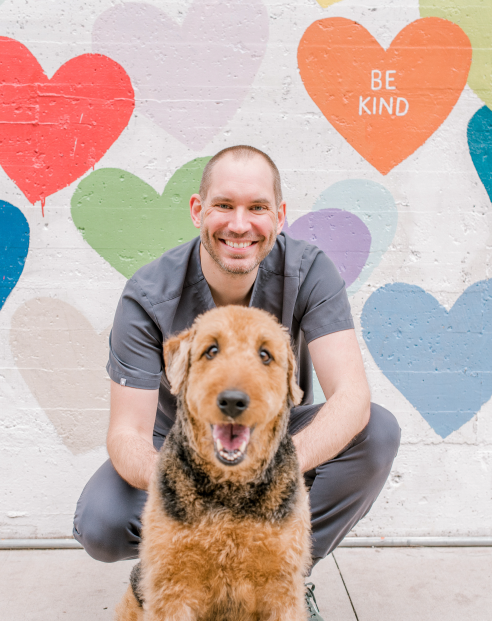
Dogwood FAQs
Getting Started
Questions that you might have about what the surgery process with Dogwood looks like.
Dogwood and your referring veterinarian will work together to coordinate a date and time for surgery. Your referring veterinarian’s hospital will then reach out to confirm your pet’s surgery.
Monitoring of your pet during surgery is required by DVSC. This is performed by a veterinary technician or assistant at your animal hospital. Your pet will also be under the care of your veterinarian and support staff while recovering from anesthesia.
DVSC has partnerships with multiple animal hospitals who we feel provide exemplary service for optimum care of your pet. We work together with your animal hospital’s staff to provide the best care possible for your pet.
We have high standards for pain management for pet’s undergoing surgical procedures or with lifelong chronic pain conditions. We require aggressive pain control both before and after surgery, usually consisting of an opioid like drug, as well a non steroidal anti-inflammatory (NSAID) medication if the patient can tolerate it. When applicable, an epidural or local anesthesia will also be used. DVSC can also provide consultations with your veterinarian on chronic pain illnesses for long-term care for your pet.
Complete surgical estimates can be obtained by contacting your referring veterinarian/hospital. Our fee is only a portion of the overall bill and does not include hospital-specific charges such as anesthesia, imaging, blood work, pain medication, etc.
Please have your veterinarian reach out to us so we can discuss your pet’s surgical needs. We welcome partnering with new hospitals so we can better serve our community.
Getting Started
Questions that you might have about what the surgery process with Dogwood looks like.
Dogwood and your referring veterinarian will work together to coordinate a date and time for surgery. Your referring veterinarian’s hospital will then reach out to confirm your pet’s surgery.
Monitoring of your pet during surgery is required by DVSC. This is performed by a veterinary technician or assistant at your animal hospital. Your pet will also be under the care of your veterinarian and support staff while recovering from anesthesia.
DVSC has partnerships with multiple animal hospitals who we feel provide exemplary service for optimum care of your pet. We work together with your animal hospital’s staff to provide the best care possible for your pet.
We have high standards for pain management for pet’s undergoing surgical procedures or with lifelong chronic pain conditions. We require aggressive pain control both before and after surgery, usually consisting of an opioid like drug, as well a non steroidal anti-inflammatory (NSAID) medication if the patient can tolerate it. When applicable, an epidural or local anesthesia will also be used. DVSC can also provide consultations with your veterinarian on chronic pain illnesses for long-term care for your pet.
Complete surgical estimates can be obtained by contacting your referring veterinarian/hospital. Our fee is only a portion of the overall bill and does not include hospital-specific charges such as anesthesia, imaging, blood work, pain medication, etc.
Please have your veterinarian reach out to us so we can discuss your pet’s surgical needs. We welcome partnering with new hospitals so we can better serve our community.
After Surgery
Questions that you might have about your pet's post-operative recovery.
Your pet will likely go on one or both of these two different pain medications – a NSAID and an opioid. Your pet may receive an antibiotic. It is very important that they receive the medications as directed by your veterinarian. If your pet has any vomiting or diarrhea, please contact your veterinarian.
When you pick up your pet, you will receive detailed post-operative care instructions that are personalized for your pet and your pet’s condition. Your veterinarian or veterinary staff will also review radiographs, physical therapy and any additional information with you when you pick up your pet. Recheck appointments can also be scheduled upon discharge from hospital.
Yes, your veterinarian will perform follow-up exams as needed per your pet’s post-operative instructions. DVSC can be contacted for postoperative questions and updates on patient recovery.
Your pet will likely go on one or both of these two different pain medications – a NSAID and an opioid. Your pet may receive an antibiotic. It is very important that they receive the medications as directed by your veterinarian. If your pet has any vomiting or diarrhea, please contact your veterinarian.
When you pick up your pet, you will receive detailed post-operative care instructions that are personalized for your pet and your pet’s condition. Your veterinarian or veterinary staff will also review radiographs, physical therapy and any additional information with you when you pick up your pet. Recheck appointments can also be scheduled upon discharge from hospital.
Yes, your veterinarian will perform follow-up exams as needed per your pet’s post-operative instructions. DVSC can be contacted for postoperative questions and updates on patient recovery.
After Surgery
Questions that you might have about your pet's post-operative recovery.

